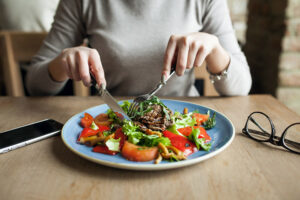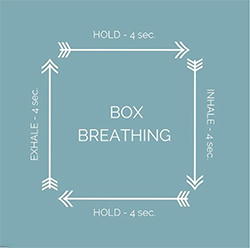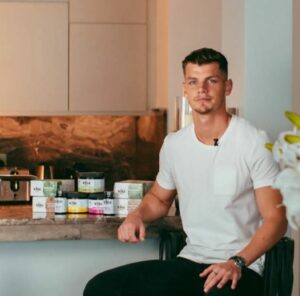Anxiety is a common mental health problem. Healthista spoke to nutritionist Rob Thorp to find out his advice on reducing anxiety naturally
Anxiety is an incredibly common disorder with one in six people experiencing symptoms in any given week in England.
Most people experience symptoms that range from feeling worried and on edge to heart palpitations or sleeplessness, but anxiety can manifest itself in a number of ways.
The condition can be mild or serious, sometimes requiring treatment like cognitive behavioural therapy or even medication.
If you suffer from mild anxiety, staying on top of it can be more simple than you think.
There is a growing body of evidence suggesting a relationship between what we eat and how we feel, as well as simple lifestyle changes that can naturally help in reducing anxiety levels.
To explain more, Rob Thorp, founder of Vite Naturals, a new plant-based functional nutrition range, shares his top ways to ward of anxiety naturally…
#1 Eat regularly
Eating regular meals is incredibly important to maintain your blood sugar levels. This in turn affects your mood.
If your blood sugar levels drop, you might feel tired, irritable, or even depressed.
Eating regularly and choosing foods that release energy slowly will help to keep your blood sugar levels steady and therefore your mood stable.
Slow-release energy foods include wholegrain pasta, rice, oats, wholegrain bread and cereals, nuts, and seeds.

#2 Pay attention to your gut health
Dysbiosis (an imbalance of good and bad bacteria in the gut), as well as inflammation of the gut have been linked to several mental illnesses, including anxiety.
The gut-brain connection is an emerging area of research that demonstrates a direct line of communication between the brain and enteric nervous system.
Researchers have shown that many mental disorders or behavioural problems can be linked to poor gut bacteria.
gut bacteria or poor digestion can contribute to poor mental health
Digestive discomfort caused by an imbalance of gut bacteria or poor digestion can contribute to poor mental health.
The encouraging news is that probiotics appear to alleviate symptoms of mental distress and anxiety by reducing the inflammation in the gastrointestinal tract, helping to improve mental health and reducing anxiety and stress.
To get a regular dose of good bacteria, try Vite Body – a new range of capsules and snack bars that combine probiotics, prebiotics, and digestive enzymes to support and aid your immune and digestive systems to function optimally, as well as help tackle anxiety.
#3 Cut back on caffeine
Anxiety naturally heightens your arousal and so does caffeine.
That boost of energy or wakefulness you feel after drinking a Red Bull or cup of coffee can be heightened if you are already anxious and could make symptoms worse.
However, coffee’s not the only culprit.
You also want to pay attention to other ways caffeine might be sneaking into your diet. Think chocolate bars, protein bars, energy drinks, and even tea.

#4 Exercise
Developing a regular exercise routine is not just helpful for people who are trying to build muscle or manage weight. Workouts can also reduce stress and boost your mood and self-esteem.
You might even notice a drop in your anxiety after a few minutes of aerobic exercise.
For long-term benefits, follow a regular exercise schedule. Try to squeeze in several hours of moderate or intense physical activity each week.
Workouts can also reduce stress and boost your mood and self-esteem
Choose a workout you enjoy, whether that involves jogging, dancing, or swimming.
#5 Get enough sleep
Not enough good-quality sleep and insomnia are common symptoms of anxiety.
That’s why it’s crucial to make sleep a priority, and if it’s something you struggle with there are simple, super-effective things you can try.
Start by not using your phone, tablet, or computer in bed. And try avoiding caffeine, big meals, and nicotine before bed.

#6 Try box breathing
It is easy to get overwhelmed with the goings-on of your life. Especially at the moment, living through uncertain times.
Focusing on your breath gives your mind a break and a chance to reconnect with your body and relax, wherever you are.
Box breathing is a breathing technique that aims to return your breathing back to its normal rhythm and help clear the mind, relax the body, and improve focus.
It is simple to practice, involving just a few steps.
- The first, inhaling through your nose and letting air fill your lungs.
- You then need to hold that breath inside, before slowly exhaling.
- Each of these steps should be held for a count of four, but this can be increased as you become more familiar with the technique.

#7 Practice yoga and meditation
Both Yoga and meditation are two great physical and mental activities.
Yoga can help in reducing anxiety and enhance your mood, as well as give you a good workout that releases feel-good endorphins.
Practising yoga can help to clear the mind and introduces a level of calmness into your life. Yoga can also enhance the level of serotonin (happiness hormone) in your body.
This combined with its stress-relieving benefits can help you to feel better, calmer and more positive.
Meditation is very similar to yoga. However, it enables you to take a second alone with your feelings and thoughts to find inner peace and positivity within yourself.
Meditation is a great way to clear your mind and alleviate negative thoughts, feelings or stresses you might have during the day.

Nutritionist and Founder of Vite Naturals, Rob Thorp
More Healthista Content:
Top London dentist reveals 8 simple ways to keep your teeth healthy
Eating disorders: 6 myths to be aware of
Model and chef Karen Koramshai shares 5 easy vegan snack recipes
From Britney Spears to Kanye West: 12 best songs proven to take your workout to the next level
